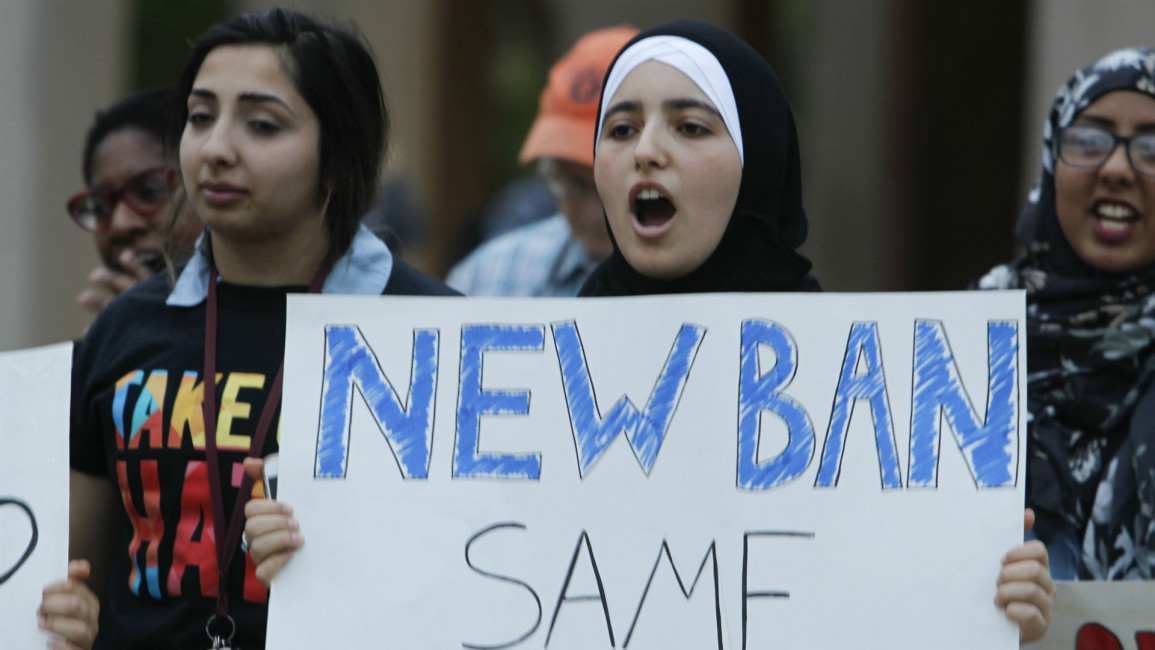US judge frustrates Trump by blocking his Travel Ban 3.0
US judge frustrates Trump by blocking his Travel Ban 3.0
Trump's pledge to end immigration from several Muslim-majority countries was kicked into touch again by a US judge on Tuesday, serving another blow for the president's widely-perceived discriminatory travel ban.
2 min read
Activists have taken to the streets to have the bill blocked [Getty]
The latest version of US President Donald Trump's so-called "Muslim Ban" was kicked into touch by a federal judge on Tuesday, hours before the law was due to come into effect.
The travel ban is in its third incarnation as Republicans attempt to have it passed into law, but Judge Derrick K. Watson in Hawaii ruled that some of the restrictions were illegal.
Although the ruling is likely to be appealed, immigration officials at US border crossings will not legally be able to bar entry to citizens of six of the eight countries in Trump's travel ban based on their nationalities.
The decision has been applauded by campaigners against the bill, who have described it as discriminatory and unconstitutional.
"We're glad, but not surprised, that President Trump's illegal and unconstitutional Muslim ban has been blocked once again," said Omar Jadwat from the ACLU's Immigrants’ Rights Project, the Washington Post reported.
Activists have taken to the streets in an eleventh hour bid to have the proposed law rejected, which has already been amended twice after previous versions were blocked by judges.
Opponents have dubbed it as a "Muslim Ban" due to restrictions falling mostly on citizens from Muslim-majority countries.
Judge Watson's decision means that citizens from Syria, Libya, Iran, Yemen, Chad, Somalia - which were on the ban list - will theoretically, at least, still be allowed to enter the US.
Nationals of Venezuela and North Korea will still be barred from the US from Wednesday, as the law stands.
Watson wrote in his findings that the proposed ban "plainly discriminates based on nationality", which is against "the founding principles of this Nation".
He also ruled that the law would be detrimental to interests of the US.
The travel ban is in its third incarnation as Republicans attempt to have it passed into law, but Judge Derrick K. Watson in Hawaii ruled that some of the restrictions were illegal.
Although the ruling is likely to be appealed, immigration officials at US border crossings will not legally be able to bar entry to citizens of six of the eight countries in Trump's travel ban based on their nationalities.
The decision has been applauded by campaigners against the bill, who have described it as discriminatory and unconstitutional.
"We're glad, but not surprised, that President Trump's illegal and unconstitutional Muslim ban has been blocked once again," said Omar Jadwat from the ACLU's Immigrants’ Rights Project, the Washington Post reported.
Activists have taken to the streets in an eleventh hour bid to have the proposed law rejected, which has already been amended twice after previous versions were blocked by judges.
Opponents have dubbed it as a "Muslim Ban" due to restrictions falling mostly on citizens from Muslim-majority countries.
Judge Watson's decision means that citizens from Syria, Libya, Iran, Yemen, Chad, Somalia - which were on the ban list - will theoretically, at least, still be allowed to enter the US.
Nationals of Venezuela and North Korea will still be barred from the US from Wednesday, as the law stands.
Watson wrote in his findings that the proposed ban "plainly discriminates based on nationality", which is against "the founding principles of this Nation".
He also ruled that the law would be detrimental to interests of the US.



